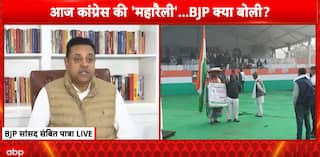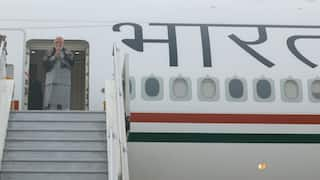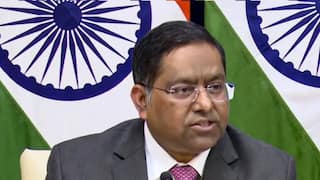Explorer
Opinion | The Citizenship Question: Unsettling Facts And The Ethos Of Hospitality
Amit Shah’s robust defence of the CAB poses some difficult problems which suggest that, even when a government or its principal functionaries do not lie, they may be on the wrong side of both history and justice.

Protest against the government's Citizenship Amendment Bill proposal to provide citizenship or stay rights to minority communities from Bangladesh, Pakistan and Afghanistan in India, in Guwahati. (File Photo/ AFP)
Governments lie all the time. It is not only authoritarian, despotic, and totalitarian states that lie, but democracies, or what are alleged to be as such, do so to. Contrary to the cherished view of some liberals, who like to represent the Trump administration as departing from the moral standards of previous administrations, especially the Obama administration, which many are now inclined to view nostalgically as some kind of gold standard of moral probity, the entire fabric of American governance has for generations been based on a tissue of falsehoods. Obama lied through his teeth—about the use of drones, the war in Afghanistan, his regime of deportations. We will be told, of course, that “context” matters. Admittedly, in the department of post-truth he is not a patch on Trump, who, it goes without saying, almost always lies—as do most of his henchmen, honchos, and hired guns. Lies, too, take various forms: a lie is not only a patent falsehood, or a statement made with the intention to deceive, but it may also be a promise made with the knowledge that it cannot be kept.
The present Indian government is, needless to say, no exception. Most of its promises, especially those not made specifically with a Hindu constituency in mind, lie in shambles. The economy is in tatters: unemployment figures are at a record high, and true to its form the government sought to have the figures withheld before the election. The Prime Minister has declared India “open defecation free”, though there isn’t a shred of evidence to support this claim. Detailed reports, some produced by the government’s own agencies, contradict Modi’s grandiose declaration. But let us leave all that aside, since the Lok Sabha has just passed by a vote of 311-80 the Citizenship (Amendment) Bill [hereafter CAB]. The government initiative was spearheaded by the Home Minister; indeed, so confident was the government, and evidently so inconsequential the matter, that the Prime Minister’s presence was not even deemed necessary. After all, the party had enough to do to sweep the polls in Jharkhand behind Modi’s campaigning.
Amit Shah’s robust defence of the CAB poses some difficult problems which suggest that, even when a government or its principal functionaries do not lie, they may be on the wrong side of both history and justice. There may be promises in his remarks that may not be kept—such as the assurance to Indian Muslims that the Bill is not directed at them, and is not even remotely designed to render them “stateless—but no one knows this for a fact. Authoritarian states may and do create distress for minorities, but they have sometimes been known to safeguard the rights of minorities, so long as such minorities do not create political unrest. These days, even autocratic rulers must show at least the outward signs of fidelity to norms of pluralism and diversity.
To understand what is truly at stake in the debate over the CAB, which amends the Citizenship Act of 1955 and was first introduced unsuccessfully in 2016, it will suffice to scrutinize its principal provision. It offers “any person belonging to [the] Hindu, Sikh, Buddhist, Jain, Parsi or Christian community from Afghanistan, Bangladesh or Pakistan” who entered India before 31 December 2014 not merely relief from deportation but citizenship of India through registration or naturalization. The critics of this provision have pointed out that the deliberate exclusion of Muslims who entered from these countries is yet another stab at Muslims and an attempt to stoke fear and insecurity among Muslims, just as it is another milestone in the long-desired plan to transform India into a Hindu nation. In more legal terms, the CAB is violative of the spirit and letter of the Constitution’s promise of equality as laid out in Article 14.
In a debate that lasted for nearly eight hours until the stroke of midnight, Amit Shah defended himself vigorously against the opposition. We may disregard, for the purposes of my argument, his repeated jabs at both Nehru and the Congress and his poor grasp of history. His contempt for Nehru is palpable, and it is not coincidental that the vote was taken at midnight—for it was at the stroke of midnight that Nehru delivered his speech pronouncing India a free country. Amit Shah and the BJP have long been promising Hindus the “freedom” that was withheld to them by the country’s Muslim rulers, the British, and finally deracinated secularists in Nehru’s mold. But the Home Minister’s observations, which are calculated to produce discomfort among secularists and liberals, are nevertheless worthy of consideration.
First, Pakistan, Bangladesh, and Afghanistan are predominantly Muslim countries. The logic that informs the CAB is that it is minorities that are in need of protection, not a majority—especially not a preponderant majority. The CAB does not, for example, furnish the promise of citizenship to a Hindu who may have come from Hindu-majority Mauritius or, more significantly, neighbouring Nepal before 2014. Once one is committed to the language of “minorities” and “majorities”, one is also committed to the corollary proposition: if anyone is in need of protection, it would be someone from a minority. Secondly, Shah takes it as demonstrably true that minorities in Pakistan, Afghanistan, and Bangladesh are indubitably in need of protection. It may be argued that he is on reasonably sound ground here. The treatment of minorities in these countries has been deplorable, even as the population of Hindus in 1951 in what was West Pakistan has remained stable in Pakistan at 1.6% since then. But, overall, the share of minorities in Pakistan’s population declined from around 23% in the late 1940s to around 3.5% at present. Non-Muslim minorities in ethnically diverse Afghanistan are practically non-existent, and the once thriving Hindu and Sikh communities have suffered precipitous decline in the preceding four decades. One may ascribe the near evisceration of these non-Muslim communities to the civil war which commenced 40 years ago, but it would be idle to pretend that the ascendancy of the Mujahideen and Islamic resurgence had nothing to do with the disappearance of non-Muslims from Afghanistan.
ALSO READ | Populist Barbarism: Killings In An Authoritarian State
One might go on in this vein, but one might also pose sticky questions. How would the government, for example, handle the claim of Ahmadiyyas, who view themselves as Muslims but have not merely been declared as heretics in both Pakistan and Bangladesh but have been subject to virulent persecution? The Bill has nothing to say on this matter, but Shah did have something to say on the matter of refugees from Sri Lanka, pointing out that the accord signed in 1964 allowed, among other provisions, for the repatriation of 525,000 Tamils to India. His third line of defence, therefore, appears to be that “whenever there has been an intervention on citizenship, it has been specific to a problem. This time, Pakistan, Bangladesh and Afghanistan refugees are getting it.” Fourthly, refuting the notion that the Bill is designed to produce a “Hindu Rashtra”, Shah noted that the percentage of Hindus in India has declined since 1951, the first census in post-independent India, from 84% to 79%. Conversely, the share of Muslims in India’s population has increased from 9.8% to 14.23%.
Such facts as Amit Shah produced, or which may be mustered on his behalf, do not appear to furnish evidence that the project of creating a “Hindu Rashtra” is at hand. But neither do such metrics tell the whole story. The secularists would be well with their right to remind everyone of the old adage which says that there are “lies, damned lies, and statistics.” But there is another tacit argument that informs the Home Minister’s observations and that has now become a critical element in the Hindu narrative of identity, prosperity, and growth. The Muslim has scores of countries—all Muslim-majority states, whether in West Asia, South Asia, Southeast Asia, Africa, and even Europe—that he can claim as his own, but does the Hindu have even one country? What else can the Hindu call his or her home other than India? (Nepal, no doubt, but the Hindu is inclined to see Nepal, which transitioned from a constitutional monarchy to federalism, as part of the Indic world rather than as a nation.) Not every nationalist Hindu may proceed to the question that logically follows, but an increasing number, taking their cue from the ideologues that have informed the Sangh Parivar, do: Does it not therefore fall upon the Hindu to decide with whom he wants to share his home, and under what conditions? Indian Muslims would be entirely right in pouncing upon the last consideration as a charter for their oppression, as a pronouncement of their eternal foreignness.
Secularists and Muslims have chosen to respond to all this in the twin languages of constitutionalism and pluralism. Those are potent languages but, at least at this moment in the nation’s history, they appear to have little traction. To be sure, there are pressing questions made possible by the invocation of pluralism, secularism, and constitutionalism. Does CAB, for instance, impose a religious test for citizenship? Though the government claims that there is nothing in the bill that adversely affects Indian Muslims, what of those Indian Muslims who may not have papers to demonstrate they belong to the soil of the country as much as Hindus, Sikhs, or Jains? And what of those Muslims who fled from Pakistan, Afghanistan, or Bangladesh to India and have made their home in India for decades? The argument that will be advanced by the government and its supporters is that all nations, even those that claim to be democracies, retain the privilege of allowing some outsiders and excluding others. Though countries such as Sweden and Denmark are often touted as examples of progressive democracies, they exercise near draconian control on whom they permit within their borders and they have normalized anti-immigrant and anti-Muslim sentiments.
ALSO READ | Opinion: The Lynching Of Jawahar Lal Nehru University
We may have to take recourse to a different language and find more productive ways of entering into these debates besides furnishing, as the Indian government does, statistics and a rather pathetic understanding of history. One might remind Hindus that the measures being undertaken by the present government will succeed in making India look very much like Pakistan, but irony is not the strong suit of the government. In India, at least, we could speak of the rich histories of hospitality. The Hindu has been made as much by sanatan dharma as by the presence, sometimes the pounding presence, of countless others in his midst. It took everyone else to make the Hindu into what he or she is today. The nationalist Hindus who oddly complain that they have had no country to call their own and that the present government is now fulfilling a long-held dream scarcely realize that whatever singularity India has had will utterly vanish if the country persists in the present course of action. Their Hinduism will begin to look very much like Islam and Christianity.
Citizenship may have been very far from the mind of Rabindranath Tagore, but the rest of the world had no difficulty in dubbing him a “citizen of the world”. Tagore had the distinct idea that a culture that is no longer aware of its own dharma is practically lost in the world. He was once traveling in his native Bengal and, at a place some 150 kilometres from Calcutta, his car overheated; every ten kilometres he had to stop and ask for water so that he could cool down the engine. The entire area was suffering from a severe drought; time after time, through fifteen villages, Tagore had quite the same experience. Though the villagers had little water to spare, and almost none to drink, their sense of hospitality made it impossible for them to refuse him water. It was their dharma, Tagore told his audience in China and then some years later at Oxford when he delivered the Hibbert Lectures on the “The Religion of Man”, that moved them to such generosity: it is the same dharma that made them reject the idea that they could, as a consequence, claim any merit or reward. What others were likely to mistake as the acts of simpletons arose from a “simplicity [that] is the product of centuries of culture” and is “difficult of imitation”; as Tagore further argues, “to be absolutely simple in one’s hospitality to one’s enemy, or to a stranger, requires generations of training.”
Who will explain this to the Home Minister and the Prime Minister, whose vanity has led them into thinking that they are required by the nation to save Hinduism from its enemies?
(Vinay Lal is a writer, blogger, cultural critic, and Professor of History at UCLA)
Disclaimer: The opinions, beliefs and views expressed by the various authors and forum participants on this website are personal and do not reflect the opinions, beliefs and views of ABP News Network Pvt Ltd.
Follow Blog News on ABP Live for more latest stories and trending topics. Watch breaking news and top headlines online on ABP News LIVE TV
View More


























